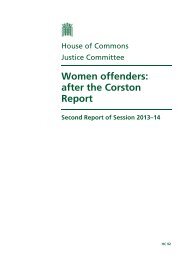Minority voices: Research into the access and acceptability of ... - MMC
Minority voices: Research into the access and acceptability of ... - MMC
Minority voices: Research into the access and acceptability of ... - MMC
- No tags were found...
You also want an ePaper? Increase the reach of your titles
YUMPU automatically turns print PDFs into web optimized ePapers that Google loves.
! Confusion over cultural identityFor some young people, <strong>the</strong> data collected suggested that one <strong>of</strong> <strong>the</strong> reasons why <strong>the</strong>y hadnot sought help with mental health problems was that <strong>the</strong>y were confused as to whe<strong>the</strong>r some<strong>of</strong> <strong>the</strong>ir feelings reflected <strong>the</strong>ir culture <strong>and</strong> different views towards problems <strong>the</strong>y hadencountered:“How much is my personality? How much is my culture?” (Focus group member/no CAMHS experience)This issue was closely linked to a range <strong>of</strong> concerns expressed by young people aboutpr<strong>of</strong>essionals making assumptions about <strong>the</strong>m on <strong>the</strong> basis <strong>of</strong> <strong>the</strong>ir ethnic group, with anumber <strong>of</strong> <strong>the</strong>m highlighting that it was <strong>of</strong>ten apparently forgotten that <strong>the</strong>y had been born inBritain. Ano<strong>the</strong>r important consideration relates to responding to questions about ethnicity;young people may be very clear about <strong>the</strong> factors that inform <strong>the</strong>ir ethnic identity but areunclear about which aspects pr<strong>of</strong>essionals see as relevant when asking <strong>the</strong> question. Thecomplexity <strong>of</strong> this is highlighted by <strong>the</strong> following comment, made by a respondent who saidthis question was always confusing due to not knowing what <strong>the</strong> pr<strong>of</strong>essional wanted to know:“I am a British Asian Muslim from Mirpur in Pakistan <strong>and</strong> speak Punjabi.” (Young person wi<strong>the</strong>xperience <strong>of</strong> using CAMHS)The key message from young people on this matter was <strong>the</strong> need to underst<strong>and</strong> <strong>the</strong>m as aperson <strong>and</strong> to appreciate <strong>the</strong> diversity <strong>of</strong> <strong>the</strong>ir needs <strong>and</strong> situations. It is also important tomake clear why <strong>the</strong> question about ethnicity is being asked <strong>and</strong> what information is actuallyrequired.! Staff underst<strong>and</strong>ing <strong>of</strong> religious <strong>and</strong> cultural needsA prominent <strong>the</strong>me linked to <strong>the</strong> previous point was that all staff in mental health servicesmust develop an underst<strong>and</strong>ing <strong>and</strong> take account <strong>of</strong> different needs:“Staff should be aware <strong>of</strong> all cultures <strong>and</strong> needs. O<strong>the</strong>rwise <strong>the</strong>y do things that are normal for<strong>the</strong>ir culture… which are not familiar to people like me…” (Young person with CAMHS experience)However a number <strong>of</strong> young people also stated that <strong>the</strong>y did not have any particular religiousor cultural needs. This returns us to <strong>the</strong> important point that staff should not makeassumptions but ra<strong>the</strong>r <strong>the</strong> important approach is one <strong>of</strong>:“Talking to people as if <strong>the</strong>y are people…thinking about <strong>the</strong>ir interests <strong>and</strong> skills <strong>and</strong> about how<strong>the</strong>ir illness affects <strong>the</strong>ir everyday lives…” (Young person with experience <strong>of</strong> adult in-patient mental heathcare)Table 2: Summary <strong>of</strong> unmet needs/service deficits identified by young people from Black <strong>and</strong> minorityethnic groups• Services unable to respond promptly <strong>and</strong> not local/easy to get to• Lack <strong>of</strong> information about CAMHS - staff roles, treatment <strong>and</strong> medication, confidentiality• Lack <strong>of</strong> information about o<strong>the</strong>r sources <strong>of</strong> help - where <strong>and</strong> what <strong>the</strong>y <strong>of</strong>fer; self-helpadvice• Lack <strong>of</strong> help with past trauma, bereavement, grief <strong>and</strong> loss• Poor continuity <strong>of</strong> care - sense <strong>of</strong> being ‘passed around’• Lack <strong>of</strong> age-appropriate resources• Staff with only limited or no awareness <strong>and</strong> underst<strong>and</strong>ing <strong>of</strong> different ethnic, religious<strong>and</strong> cultural needs• Interpreter support - not available or long wait times• Post-discharge support <strong>of</strong>ten not available• Information <strong>and</strong> support for parents unaddressed<strong>Minority</strong> Voices <strong>Research</strong> Report29
















